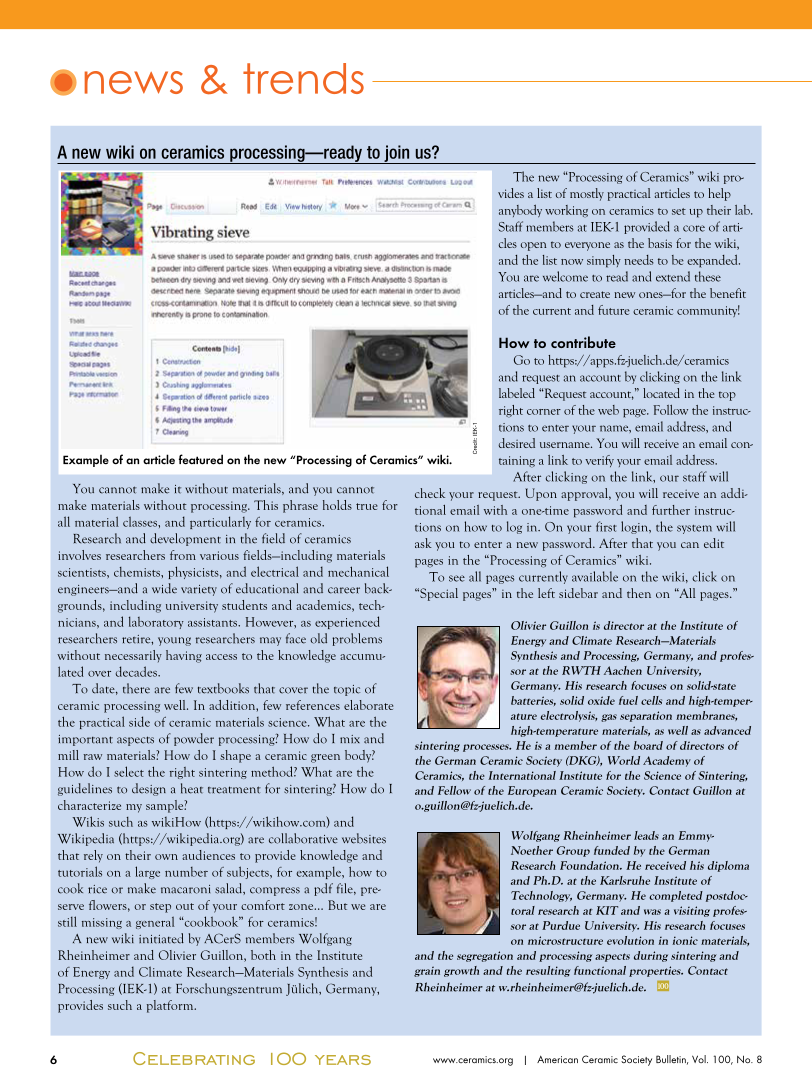www.ceramics.org | American Ceramic Society Bulletin, Vol. 100, No. 8 6 Celebrating 100 years news & trends A new wiki on ceramics processing—ready to join us? You cannot make it without materials, and you cannot make materials without processing. This phrase holds true for all material classes, and particularly for ceramics. Research and development in the field of ceramics involves researchers from various fields—including materials scientists, chemists, physicists, and electrical and mechanical engineers—and a wide variety of educational and career back- grounds, including university students and academics, tech- nicians, and laboratory assistants. However, as experienced researchers retire, young researchers may face old problems without necessarily having access to the knowledge accumu- lated over decades. To date, there are few textbooks that cover the topic of ceramic processing well. In addition, few references elaborate the practical side of ceramic materials science. What are the important aspects of powder processing? How do I mix and mill raw materials? How do I shape a ceramic green body? How do I select the right sintering method? What are the guidelines to design a heat treatment for sintering? How do I characterize my sample? Wikis such as wikiHow (https://wikihow.com) and Wikipedia (https://wikipedia.org) are collaborative websites that rely on their own audiences to provide knowledge and tutorials on a large number of subjects, for example, how to cook rice or make macaroni salad, compress a pdf file, pre- serve flowers, or step out of your comfort zone… But we are still missing a general “cookbook” for ceramics! A new wiki initiated by ACerS members Wolfgang Rheinheimer and Olivier Guillon, both in the Institute of Energy and Climate Research—Materials Synthesis and Processing (IEK-1) at Forschungszentrum Jülich, Germany, provides such a platform. The new “Processing of Ceramics” wiki pro- vides a list of mostly practical articles to help anybody working on ceramics to set up their lab. Staff members at IEK-1 provided a core of arti- cles open to everyone as the basis for the wiki, and the list now simply needs to be expanded. You are welcome to read and extend these articles—and to create new ones—for the benefit of the current and future ceramic community! How to contribute Go to https://apps.fz-juelich.de/ceramics and request an account by clicking on the link labeled “Request account,” located in the top right corner of the web page. Follow the instruc- tions to enter your name, email address, and desired username. You will receive an email con- taining a link to verify your email address. After clicking on the link, our staff will check your request. Upon approval, you will receive an addi- tional email with a one-time password and further instruc- tions on how to log in. On your first login, the system will ask you to enter a new password. After that you can edit pages in the “Processing of Ceramics” wiki. To see all pages currently available on the wiki, click on “Special pages” in the left sidebar and then on “All pages.” Olivier Guillon is director at the Institute of Energy and Climate Research—Materials Synthesis and Processing, Germany, and profes- sor at the RWTH Aachen University, Germany. His research focuses on solid-state batteries, solid oxide fuel cells and high-temper- ature electrolysis, gas separation membranes, high-temperature materials, as well as advanced sintering processes. He is a member of the board of directors of the German Ceramic Society (DKG), World Academy of Ceramics, the International Institute for the Science of Sintering, and Fellow of the European Ceramic Society. Contact Guillon at o.guillon@fz-juelich.de. Wolfgang Rheinheimer leads an Emmy- Noether Group funded by the German Research Foundation. He received his diploma and Ph.D. at the Karlsruhe Institute of Technology, Germany. He completed postdoc- toral research at KIT and was a visiting profes- sor at Purdue University. His research focuses on microstructure evolution in ionic materials, and the segregation and processing aspects during sintering and grain growth and the resulting functional properties. Contact Rheinheimer at w.rheinheimer@fz-juelich.de. 100 Example of an article featured on the new “Processing of Ceramics” wiki. Credit: IEK-1
(c) 2024 American Ceramic Society. All Rights reserved.




















































